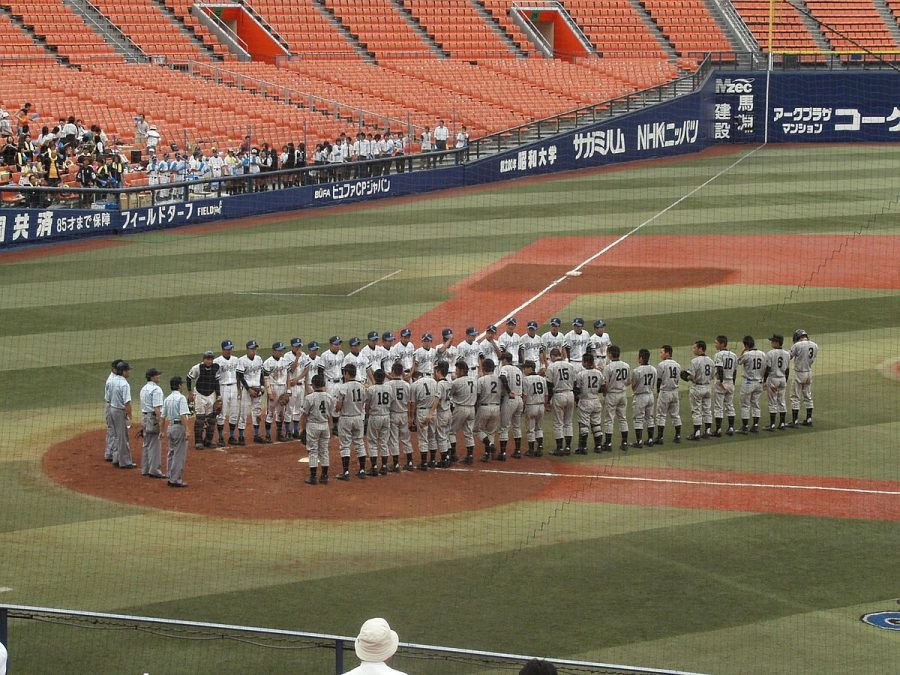Etsuo’s Corner: sports and culture
High school baseball in Yokohama Stadium, Japan. By I, DX Broadrec, CC BY-SA 3.0,https://commons.wikimedia.org/w/index.php?curid=2443925
Editor’s note: Etsuo’s Corner is a weekly column for World & Nation by Etsuo Fujita, an international student from Japan. Fujita features the stories of other international students or writes about his adventures and impressions as he learns about the cultures and customs of Guilford and his travels in America.
On Oct. 28, I attended the 2017 ODAC Cross Country Championship at Virginia Wesleyan University. I got a chance to join the race as a member of Guilford’s Cross Country team. Although every practice is rather difficult for me, Cross Country overall is a very fun experience. By being on the team, I’ve felt significant differences between sports teams here and in Japan. To introduce an experienced perspective on athletic teams in Japan, I interviewed Shintaro Sasano, an international student from Japan at Guilford.
In general, Japanese teams have a certain hierarchical system in athletic activities where junior players have a hard time. Sasano was in one of these strict baseball teams in high school and he talked to us about his experience. Although this experience is not common to all Japanese players, there are many people who have experienced this rigid form of team sports.
As a note, in Japan, there are three years of high school. When Sasano refers to senior players, he means players in the second or third year of high school, and junior players are those either in the first or second years. Here is Shintaro’s story:
“I belonged to a high school baseball team in Osaka, one of the biggest cities in Japan. My team was strong in the city and my life … (on) the team was very hard. There were several hard aspects … (on) the team. First, senior players had great power …(over) first-year players, and first-year players could not say “no” or reject what senior players asked them to do.
For example, in (the) first several months, sophomore players decided our training schedule. The training was mostly occupied running and strength training and it was very strict. Some players got injured because of the strict training. In addition, I was asked to assist their practice and assisted them for a long time, so I could not practice for myself because … (I was providing) assistance … (during) my first year.
Next, there were some rules only for first-year players. They were not allowed to make eye contact with third-year players. They were also not allowed to sit in (the) bus or train on our way to school and home. They could not use (the) cafeteria or vending machine in our school. In addition, they needed to come to the practice one hour before to prepare… It was (every)first-year player’s job and they needed to support senior players.
Thirdly, there was a kind of collective responsibility. For example, if some players broke school rules or laws such as smoking or violence, we could not participate in the championship. All of us needed to … (weed) … our baseball field instead of practice because we were not allowed to practice in that situation.
My life in high school was so hard because of the strict rules and practice. I did practice almost every day and we had practices even on national holidays. Although it was so hard, I could develop myself as a person. I could overcome the severe experience and there might be no harder situation than that. My high school life gave me a lot of confidence. I look back at it as one of the great things of my life.”
Unlike Sasano, I do not feel such a hierarchy system in my current Cross Country team. There is a captain in the team who has great leadership for the team and so far, I have not experienced a hierarchy relationship among players. In my opinion, this atmosphere or system in my U.S. team might be related to individualism. As I mentioned about the prominence of individualism in the U.S in my first column, I feel a strong cultural difference between Japan’s collectivism and America’s individualism. So, there is no “collective responsibility” and I really enjoy running. I think this change has been the biggest difference in my experience.
As Sasano told us, Japanese sports team culture might have aspects that are strange for Americans, and these differences probably stem from Japanese culture. I’ve also heard some stories of children who came back from the U.S. to Japan and were surprised by difference in team sports when they joined baseball teams in Japan. After joining the Cross Country team, I can now confirm both viewpoints, through this good chance of experiencing the cultural differences between international teams. By running every day, I am experiencing a completely new culture.










Boojito Boy • Nov 14, 2017 at 10:59 pm
I’m glad you got to participate in the cross country teams here at Guilford, along with sharing the different perspectives on sports in japan.